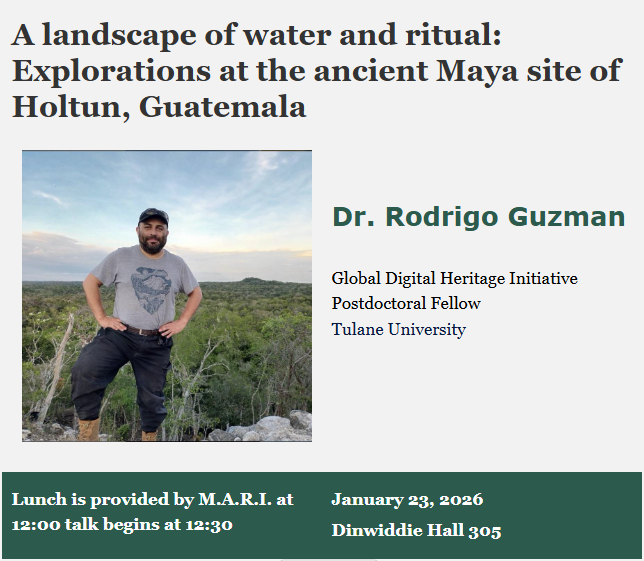
This Friday, January 23, 2026, Dr. Rodrigo Guzman (Middle American Research Institute, Tulane University) will present "A Landscape of Water and Ritual: Explorations at the Ancient Maya site of Holtun, Guatemala."
Abstract: Water management practices among ancient Maya sites varied according to multiple factors, including landscape morphology, sociocultural period, and local power dynamics. Nevertheless, these practices shared common ideological motivations and were intrinsically related to the development of social dynamics. The modest-sized site of Holtun contributes to the growing body of water management research in Maya archaeology. Although water resources at Holtun are relatively limited, they supported the development of a community in the Middle Preclassic period (1000 to 350 BCE), when the site flourished with some centralized and peripheral water catchments. In addition, water springs and clear-water creeks remained on the outskirts of the site, with no apparent settlement associated. However, during the Late Classic period (500-900 CE), permanent settlement exhibiting signs of social status emerged outside of the civic-ceremonial center, claiming territory closer to water resources. Although the relationship between these settlements and these water resources at Holtun is not fully understood, the evidence suggests that territorial control over water resources was a primary motivating factor. This presentation examines the process of mapping and understanding the landscape of Holtun between 2010 and 2021.
Bio: Archaeologist from Quetzaltenango, Guatemala, he specializes in Maya Archaeology, Landscape Archaeology and the application of Geographic Information Systems (GIS) cultural heritage. He earned his PhD from the University of Central Florida (2022) as a member of the inaugural cohort of the Integrative Anthropological Sciences doctoral program and its first international student. He also holds a Master of Arts in Anthropology from UCF (2017) and an undergraduate degree in Archaeology from Universidad del Valle de Guatemala (2010). His research experience includes mapping projects across the Maya Lowlands, Highlands, and Pacific Coast of Guatemala. Currently, he is the Global Digital Heritage Initiative Postdoctoral Scholar at the Middle American Research Institute (MARI) and serves as a GIS advisor for the UCF-Lidar Mirador Project.

